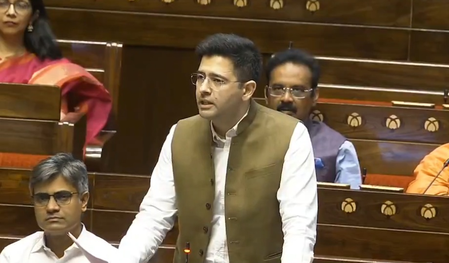New Delhi, 1 April (IANS). Recently, Aam Aadmi Party (AAP) MP Raghav Chadha raised questions in the Rajya Sabha on Tuesday regarding the incidents in the country’s judiciary. Emphasizing the need for judicial reforms in the country, he said that the people of India consider the court to be a temple of justice and when a common citizen goes to its frame, he is confident that he will get justice.
MP Raghav Chadha said, “Just as it may be late in the court of the above, but not dark, it is believed that even though it takes time in the judiciary, there will be no injustice. From time to time the judiciary has further strengthened this trust, some incidents have worried the country in recent days, due to which it has become necessary to focus on judicial reforms.”
MP Raghav Chadha in his speech emphasized that just as elections reforms, police reforms, education and health sector have improved in the country, similarly reforms are needed in the judiciary. We want reforms that strengthen the judiciary, not weakened it.
He raised two important issues, first, the appointment process of judges and second, the tradition of giving post retirement jobs to retired judges.
He said that the shortcomings of the collegium system have been revealed from time to time. Law Commission reports and many intellectuals in the legal sector have mentioned these flaws several times. Perhaps this is why the need for laws like the National Judicial Appointments Commission (NJAC) was felt. But, now the time has come for the collegium system to improve itself and reorganize itself afresh. To overcome these shortcomings, an independent and transparent process must be created, in which judges are appointed on the basis of seniority, merit and honesty.
For this, he also presented a suggestion. He said that the process of granting senior advocate status to lawyers before today was opaque, but the Supreme Court made guidelines for this. Today, the point-based system has been implemented for them, under which senior advocate is appointed, with the year of practice, the number of pro bono cases and marks on the basis of reported judges.
He proposed that if the collegium system also adopts a similar transparent, point-based and merit-based system, then the public confidence in the appointment of judges will increase further.
MP Raghav Chadha also questioned the situation after the retirement of the judges. He said that it has become a trend that governments appoint retired judges to administrative or executive positions. This raises questions such as conflict of interest, executive intervention and impact on pre -retirement decisions. He said that this situation gives rise to ‘Conflict of Interest’ and there is a possibility of government affecting judicial decisions.
He cited Article-148 of the Indian Constitution, saying that he cannot be appointed to any government post after the retirement of the Comptroller and Auditor General (CAG). Similarly, rules should also be made for judges. He suggested that if complete restrictions are not possible, then at least two years of mandatory cooling-off period should be implemented, so that the Central or State Government cannot appoint the judges to any government post for two years after retirement. If these reforms apply, it will prove to be a historical step in India’s judicial history.
He further said, “We consider the countryman court to be a temple and consider the judges to be the idol of justice. If these judicial reforms apply, the public’s trust in the judiciary will be deeper.”
-IANS
SK/ABM
